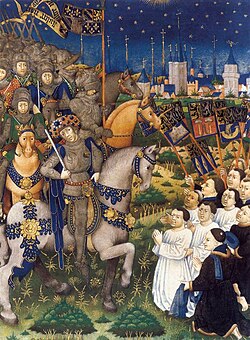Revolt of Ghent (1449–53)
| Ghent Revolt | |||||||
|---|---|---|---|---|---|---|---|
| Part of the | |||||||
 The burghers of Ghent surrender to Philip the Good at the Battle of Gavere. Illustration from a contemporary manuscript. |
|||||||
|
|||||||
| Belligerents | |||||||
|
|
|
||||||
| Commanders and leaders | |||||||
|
|
|||||||
Burgundian victory:
The revolt of Ghent was a rebellion by the city of Ghent against the Duchy of Burgundy. It lasted from 1449 to 1453. The rebellion was eventually suppressed by the Burgundians.
After their efforts in the Battle of the Golden Spurs (1302), the guilds demanded and received the so-called small "Nering": participation in the rule of the Flemish cities, something which was not an uncommon result in the wars and battles involving the low countries. In Ghent, a relative equilibrium was achieved between 1360 and 1380, where the schepenen formed a coalition called the Great council of Ghent. The council had three members; one was chosen by the poorters (a type of citizenship), one was chosen by the influential guild of weavers (Flanders had become rich because of its cloth production), and one was chosen by the smaller guilds . This trio was called the Rule of the Three Council Members.
From around 1430, Philip the Good strove for a return of the situation before the Guldensporenslag; the influence of the guilds, especially those with arch-deacons (in the Low countries, Deacon was also used to denote the leaders of guilds), was in conflict with the Charter of Senlis (1301) according to Philip. The Ghent city government based its defense against Philip's claims on customs and old privileges from the 12th and 13th century, before the Charter of Senlis had been signed. To enforce his attempts at gaining control over the appointment of city officials, Philip the Good also searched for a reliable source of income. This he found in the rich Flemish cities, where he raised indirect taxes. Until then he had been forced to rely on requests for individual taxes (called beden), which could be refused by the city government.
During his visit to Ghent in January 1447, Philip proposed a semi-permanent tax on salt, after the French example of the Gabelle. Later he proposed a similar tax on flour, which would be collected by ducal officials. Salt at that time was very important as it was the only way to preserve food for long periods of time. Philip had prepared a speech in Dutch, the principal language of the Council, and the deacons of some of the guilds were consulted or bribed. The city government of Ghent refused to give in. After two years of negotiation, the taxes were rejected. Wanting to avoid further humiliation, Philip decided not to propose the taxes to other large Flemish cities. Philip accused the deacons of perjury and removed them from the Council. In reaction, Ghent proposed to replace them with outspoken opponents of the Duke. Philip increased the pressure with measures such as recalling the bailiff twice, bringing all judicial procedures in the city to a halt.
...
Wikipedia
